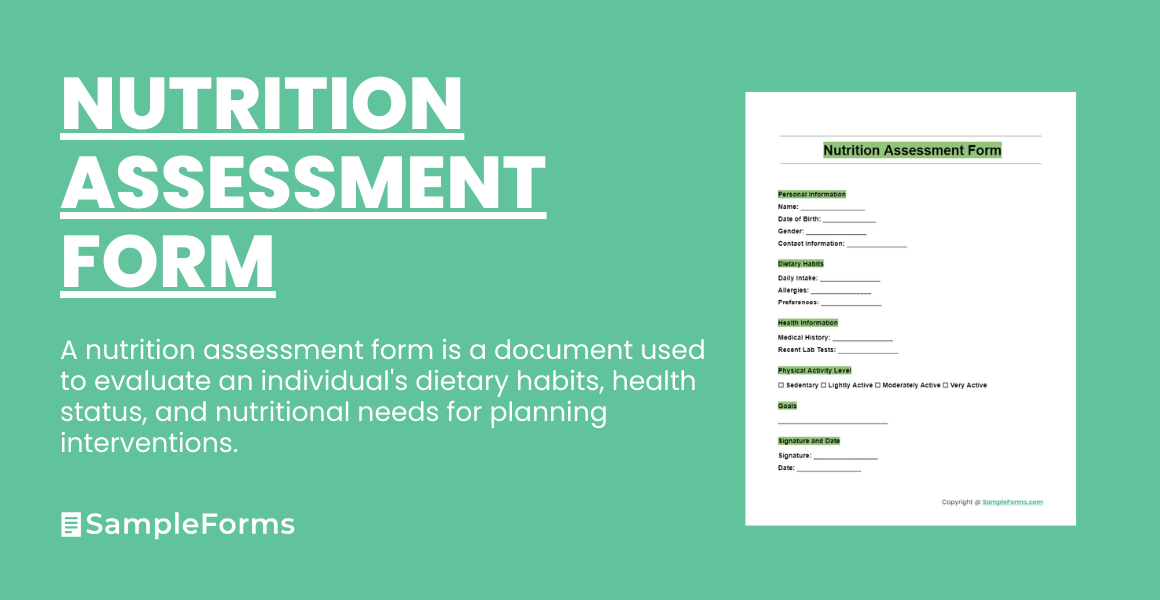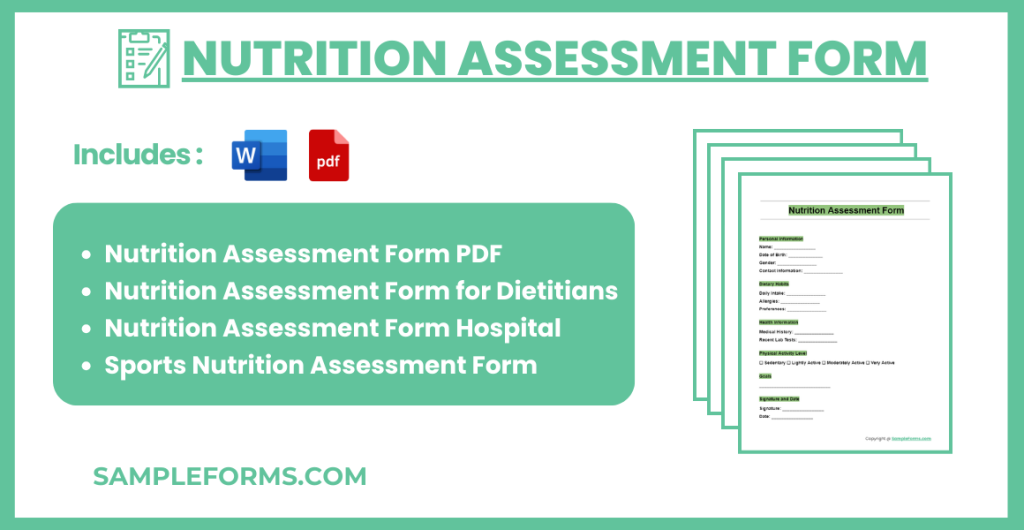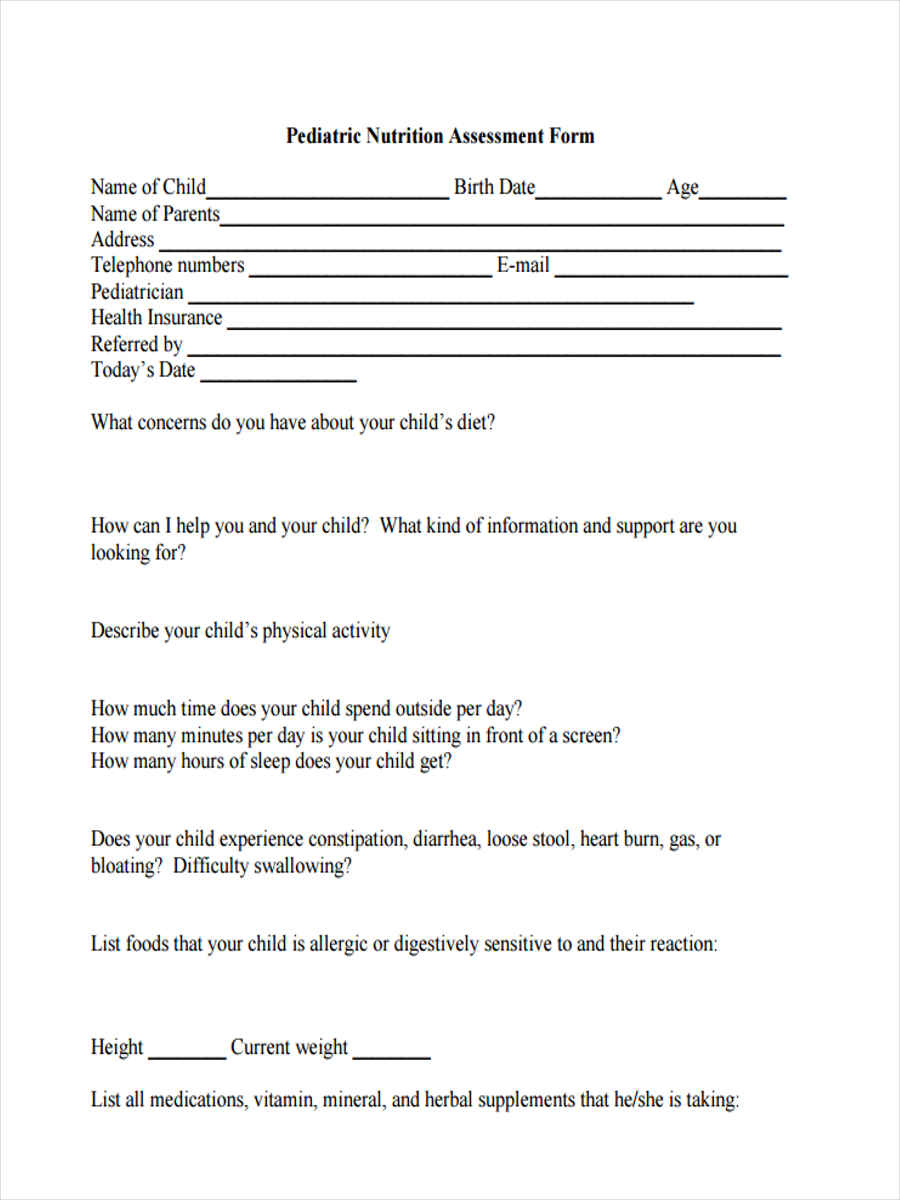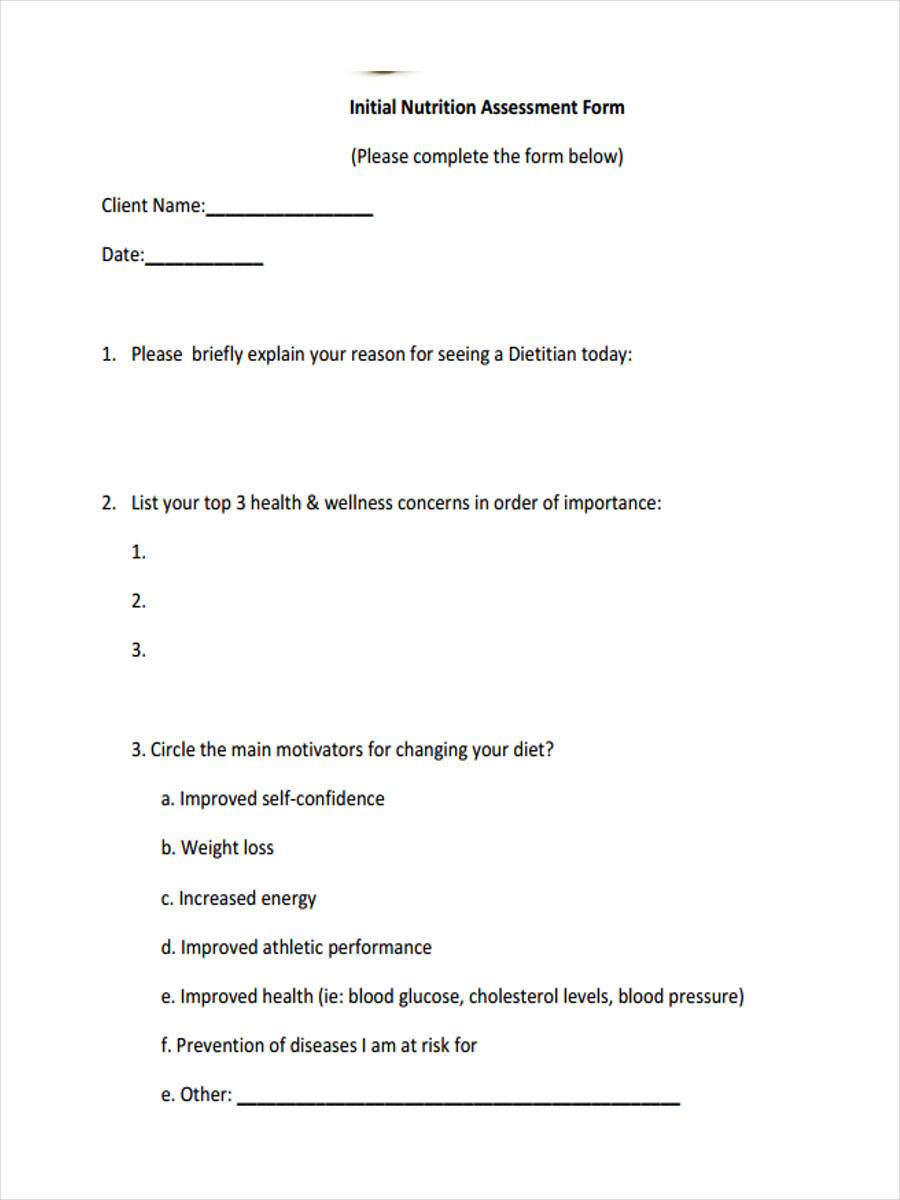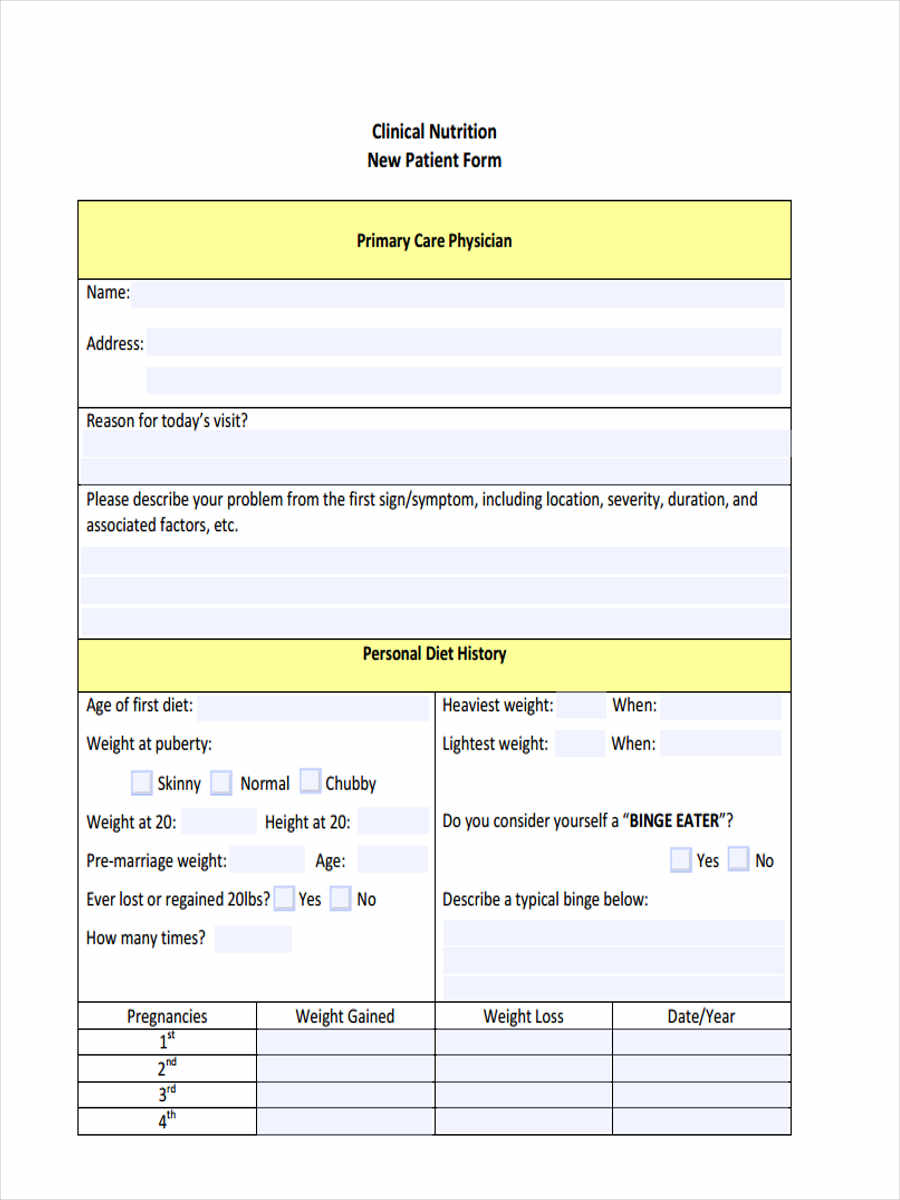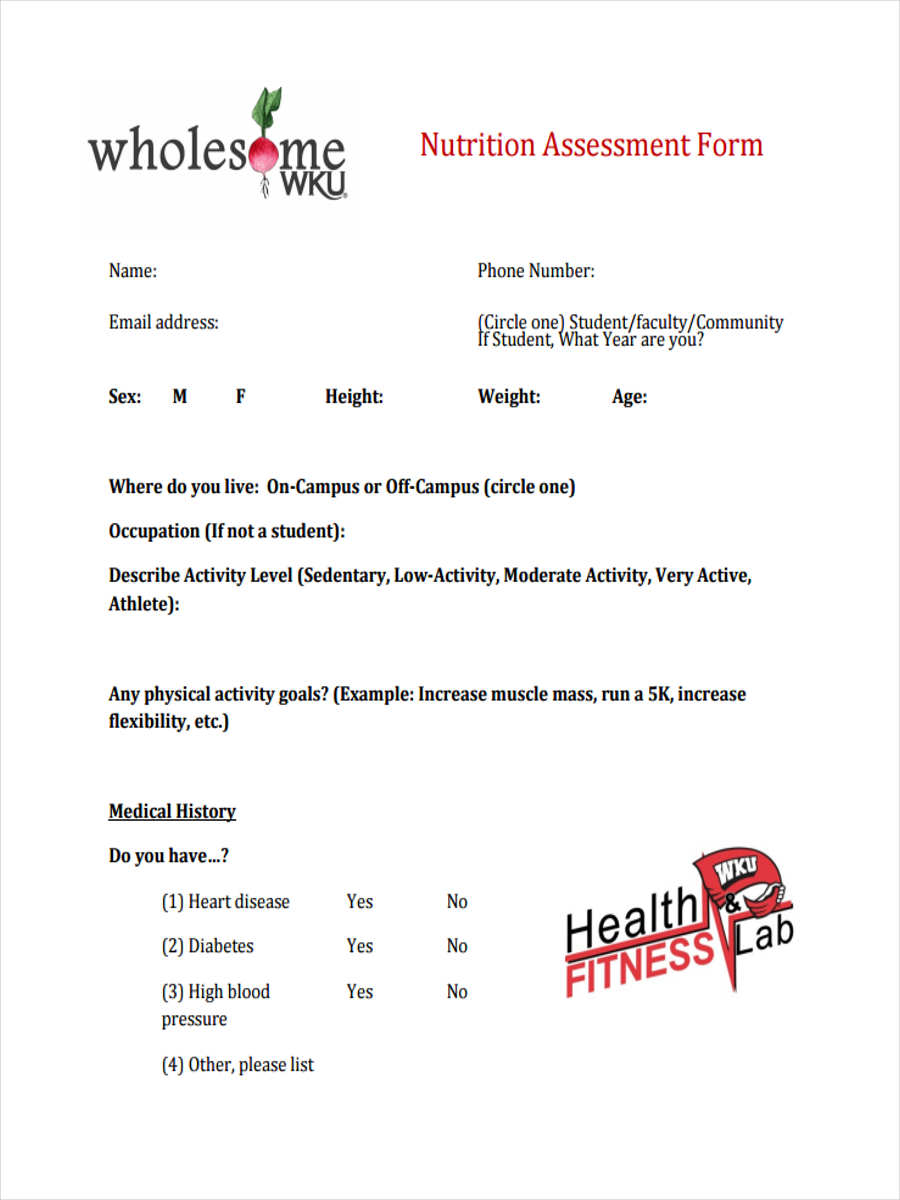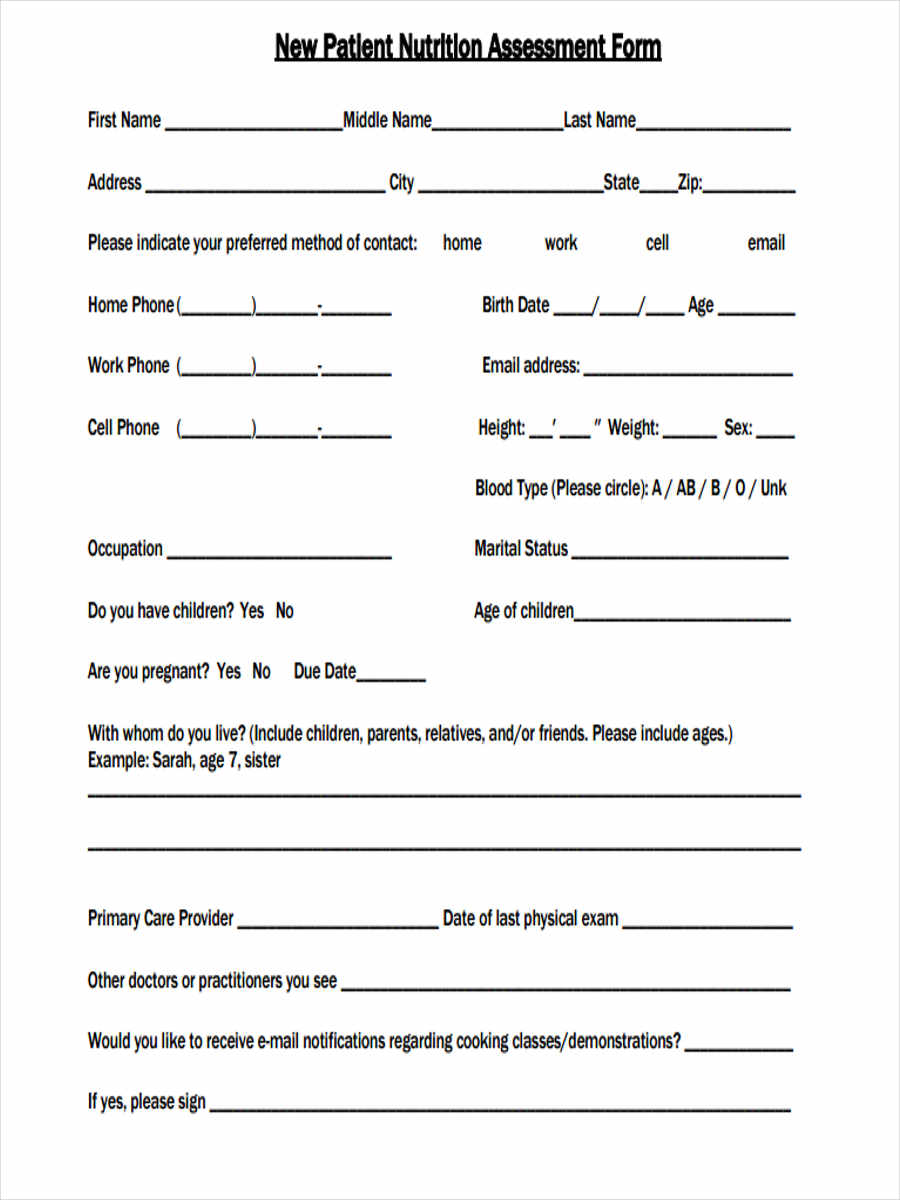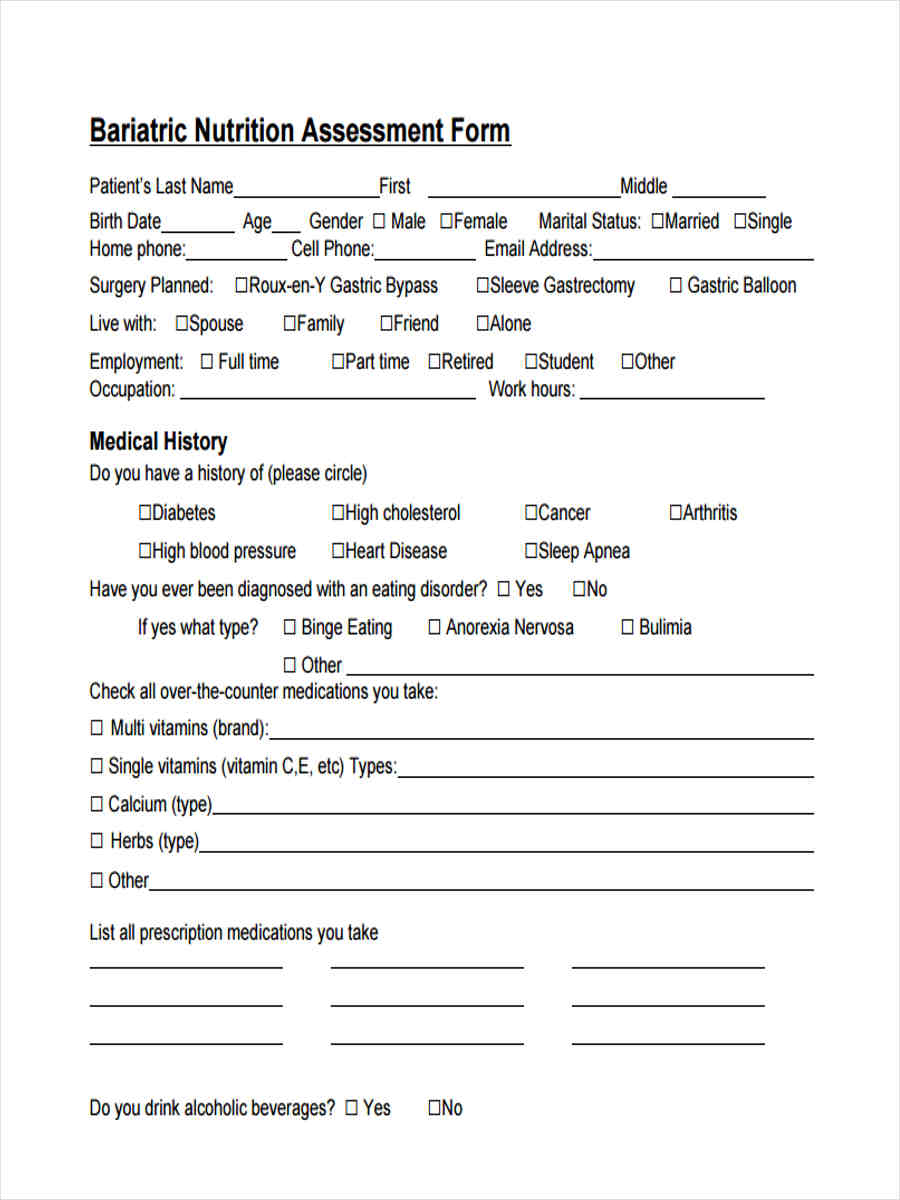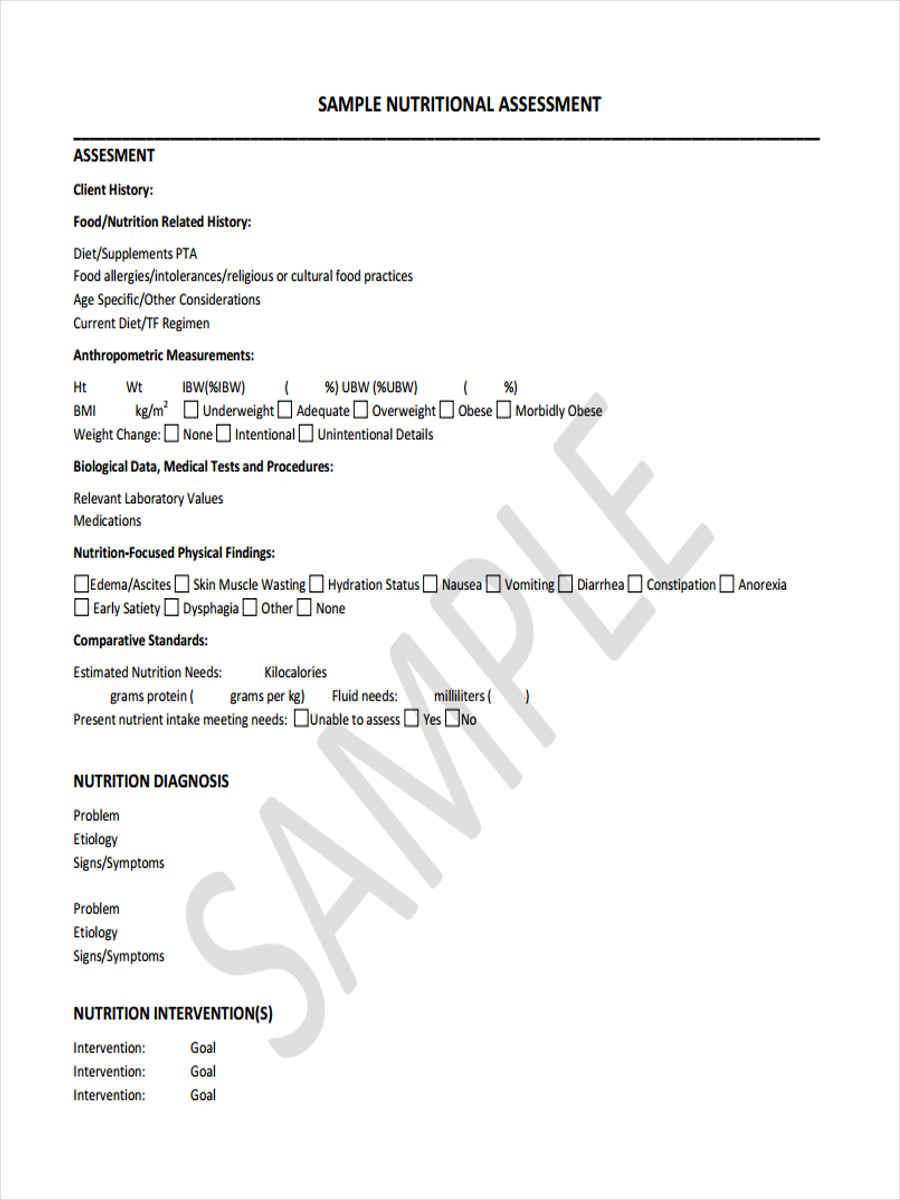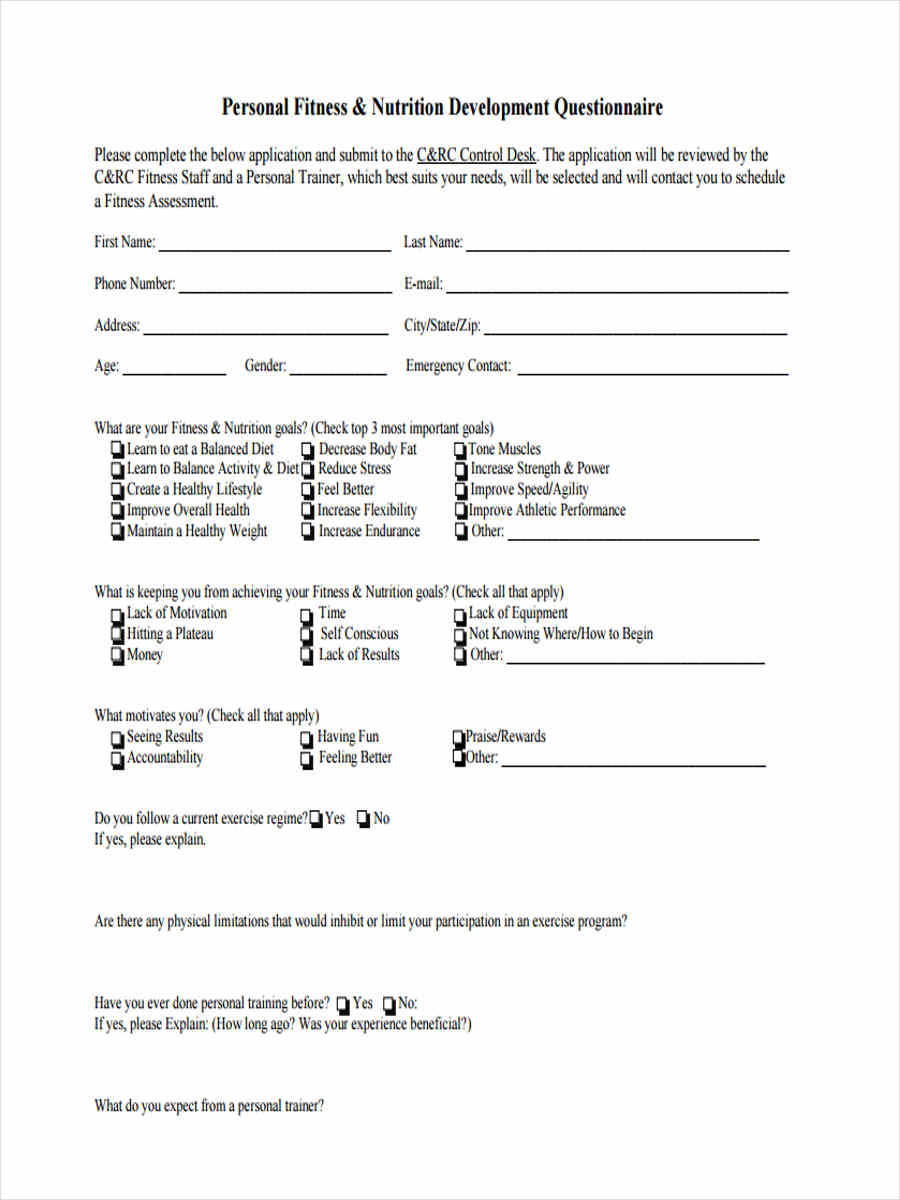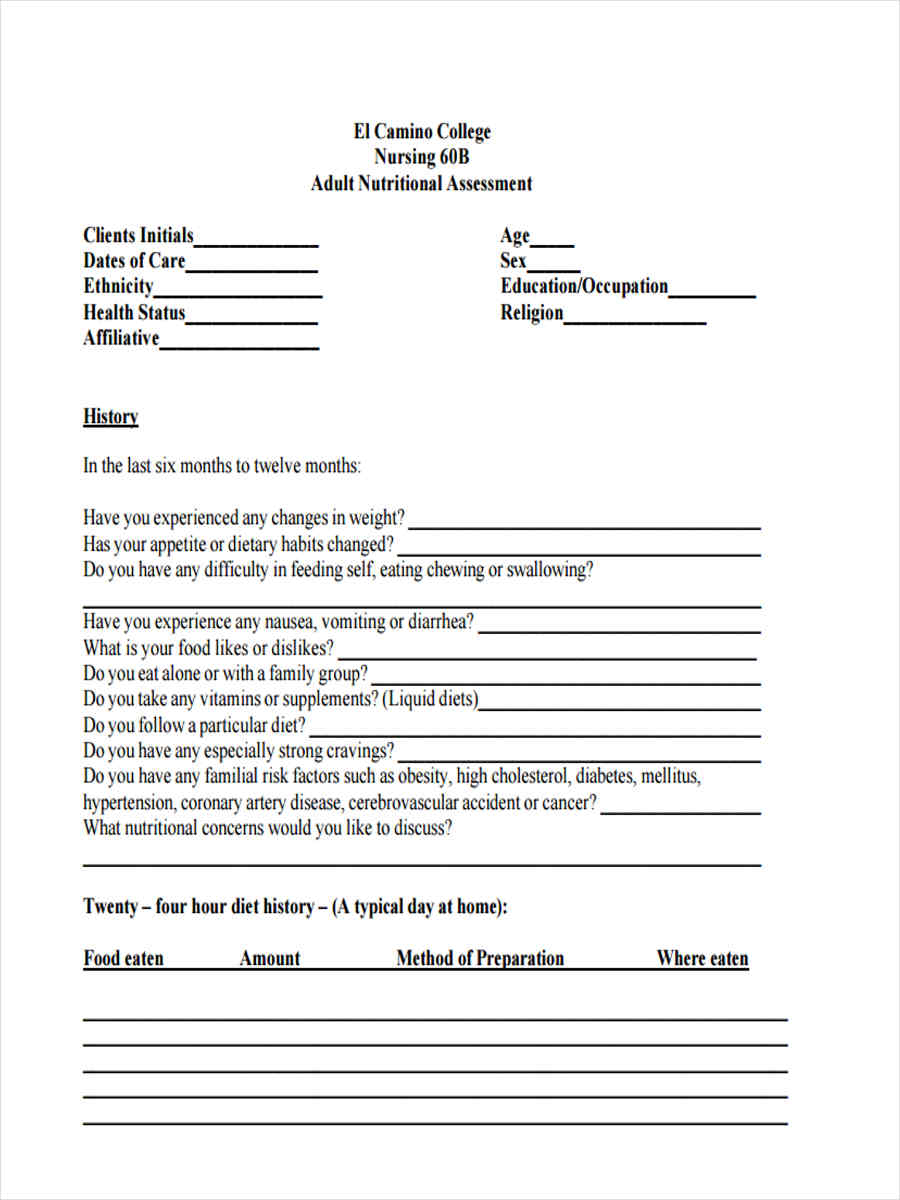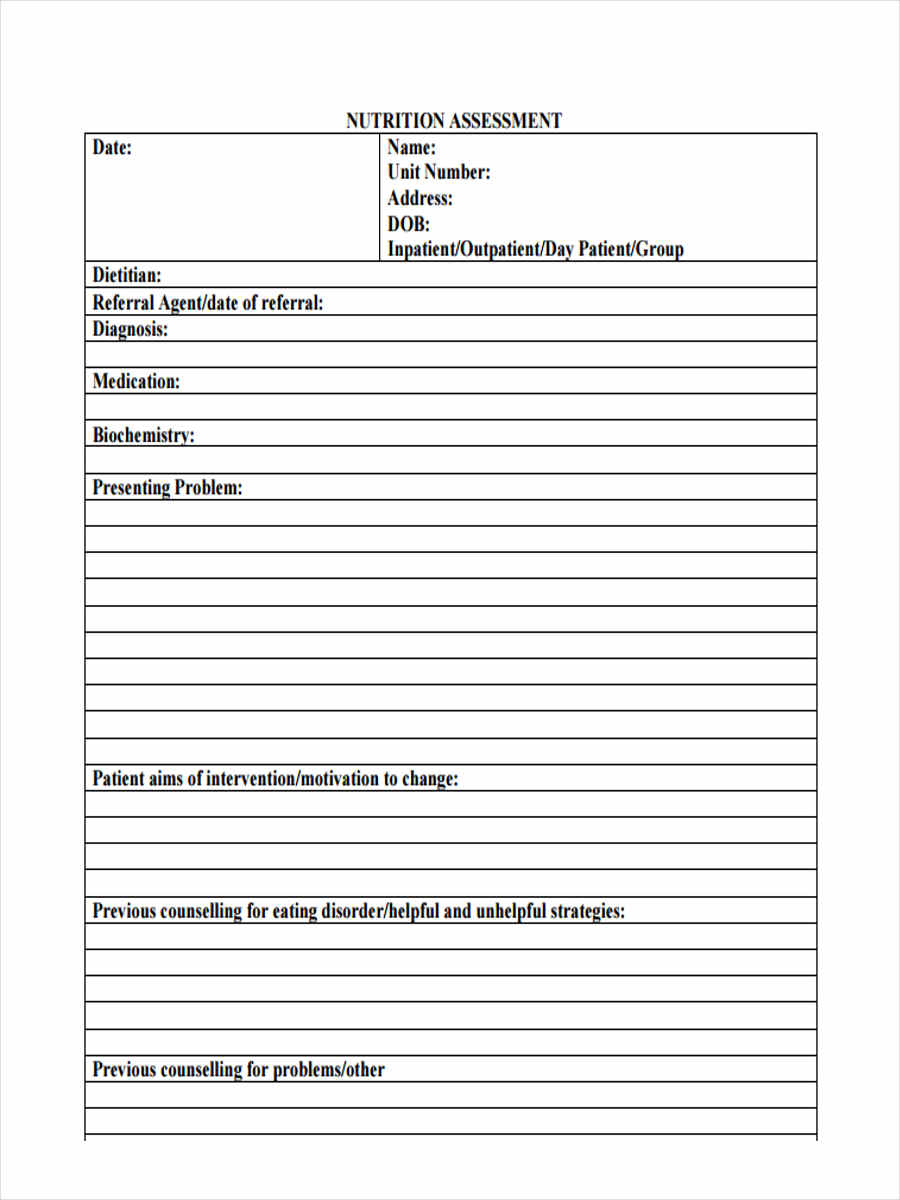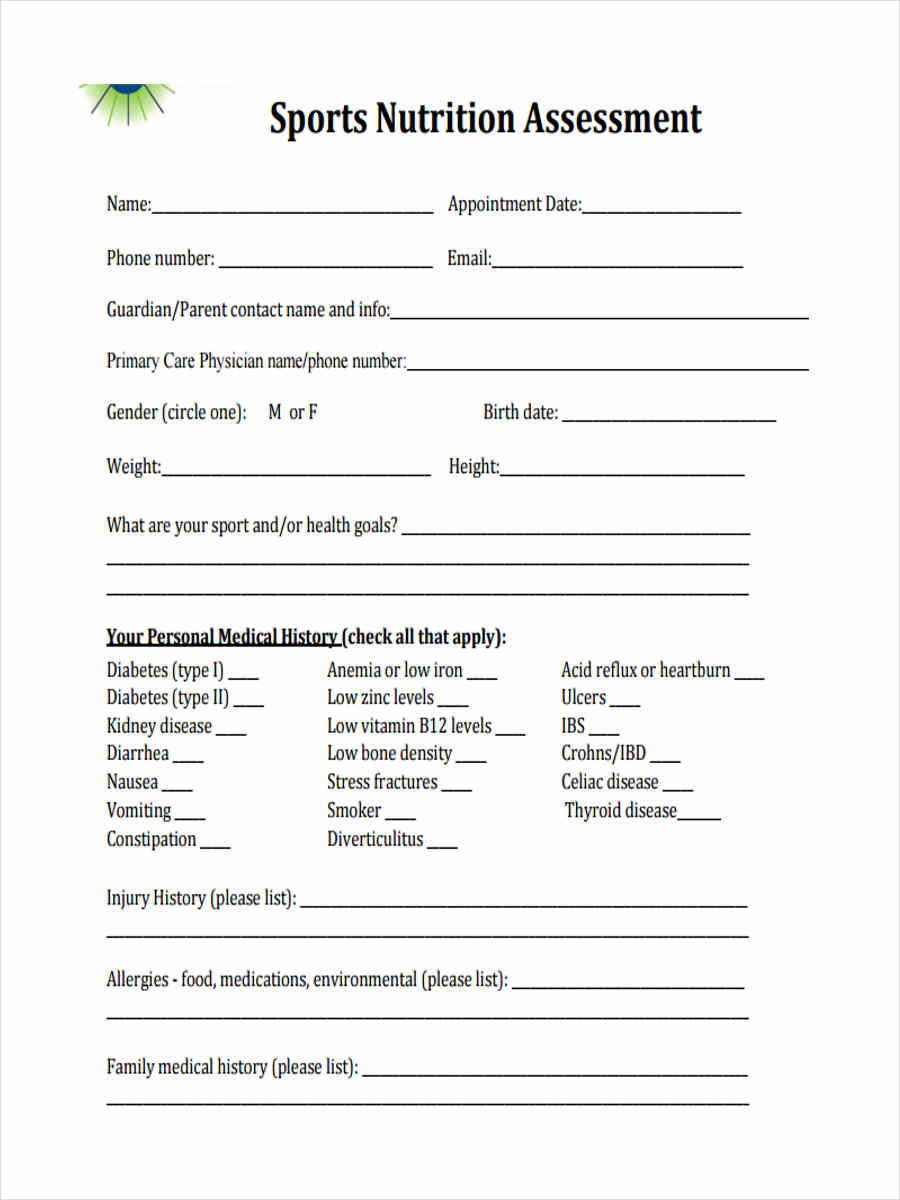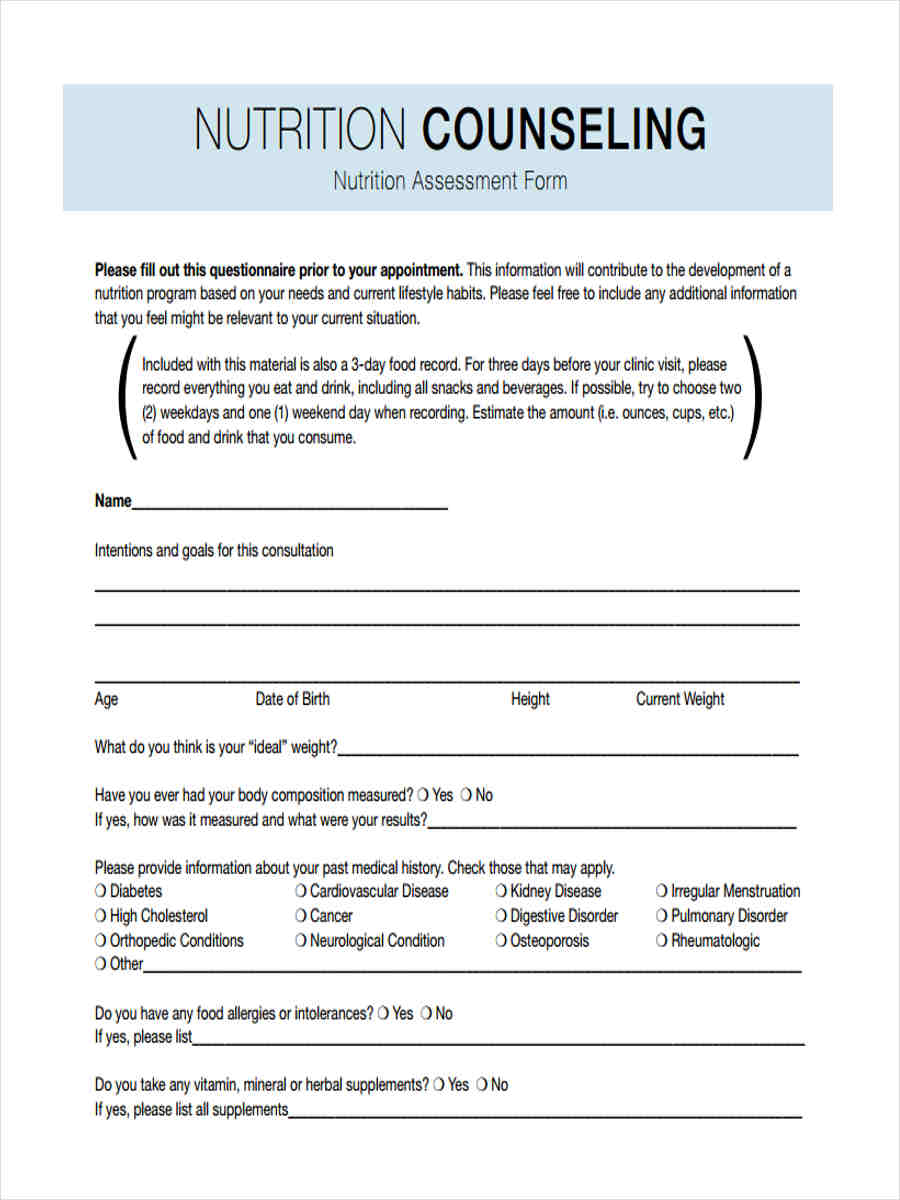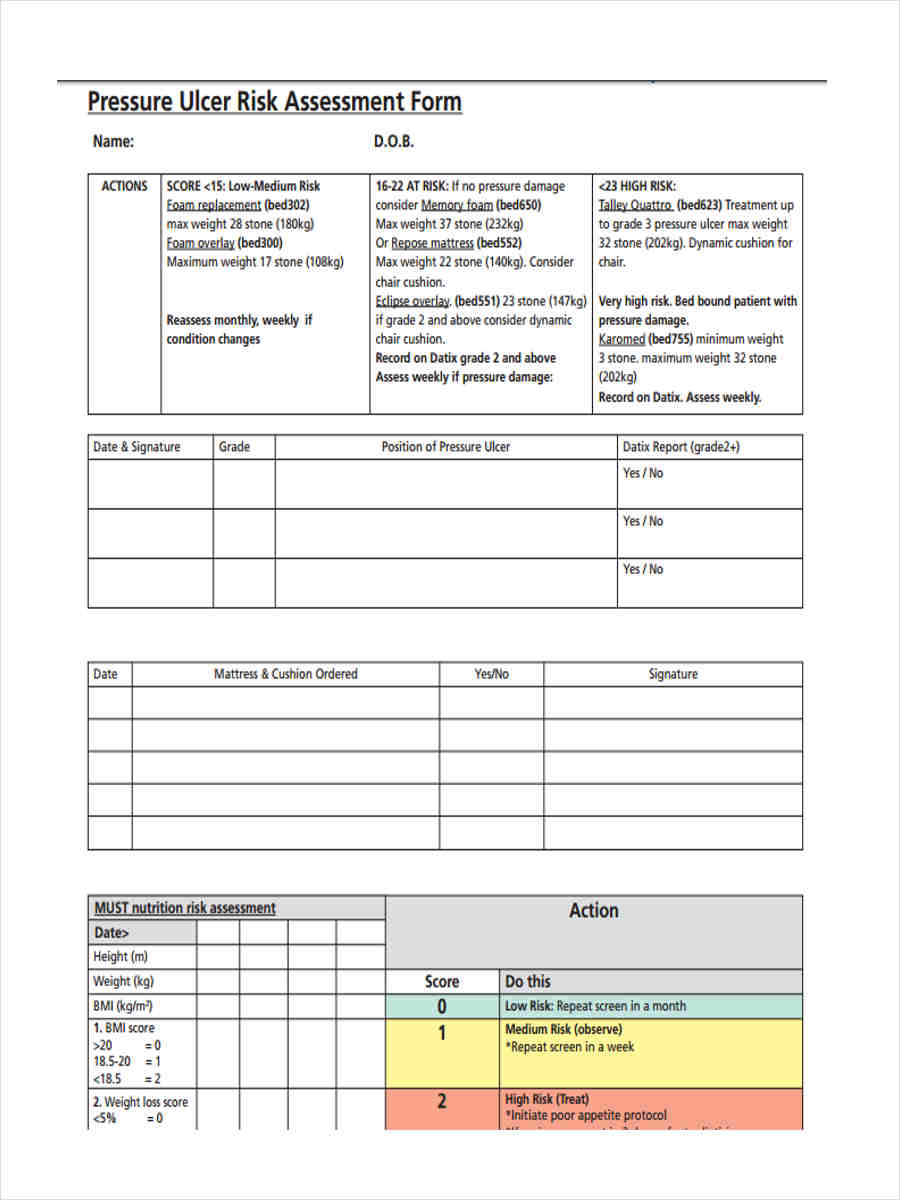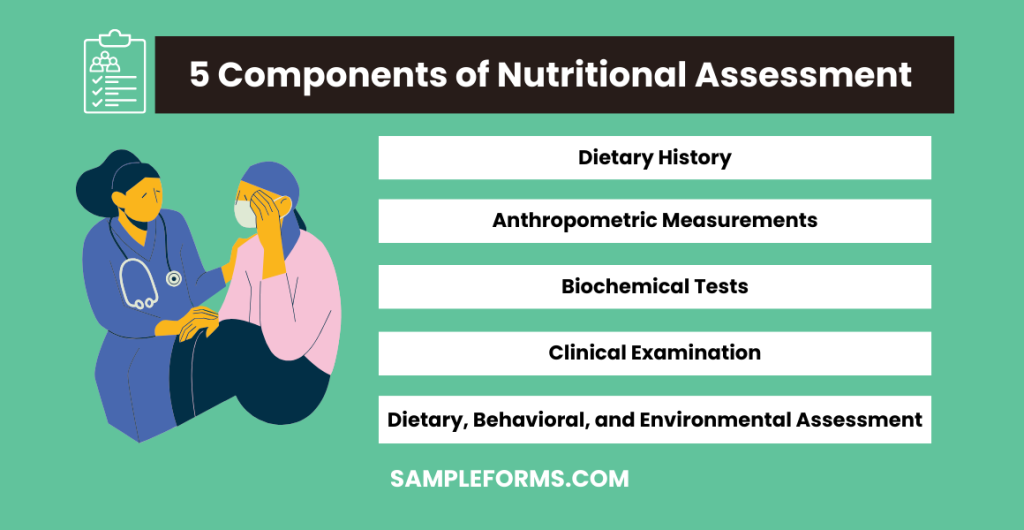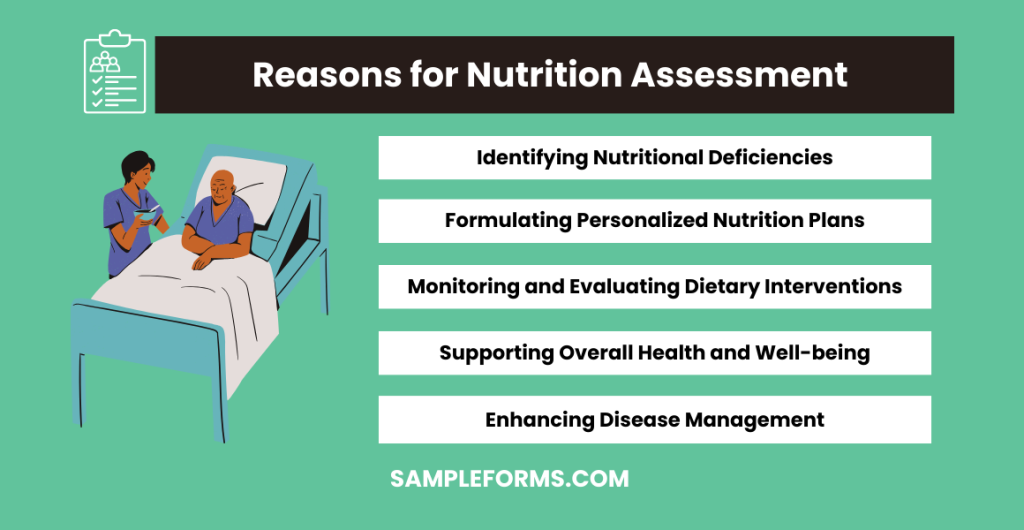Dive into our detailed guide on Nutrition Assessment Forms, your first step towards a healthier lifestyle. This guide intricately combines the use of an Assessment Form and Assessment Form for Intake to systematically evaluate your dietary habits and nutritional needs. Packed with practical examples, it’s designed to provide you with a comprehensive understanding of how to accurately assess and enhance your nutrition for optimal health.
Download Nutrition Assessment Form Bundle
What is Nutrition Assessment Form?
A Nutrition Assessment Form is a detailed questionnaire used by healthcare professionals to evaluate an individual’s dietary habits, nutritional status, and overall health. This form plays a crucial role in identifying nutritional deficiencies, dietary patterns, and lifestyle choices that may impact health. It serves as a foundation for developing personalized nutrition plans, aiming to improve dietary habits and promote well-being.
Nutrition Assessment Format
Personal Information
- Name:
- Date of Birth (MM/DD/YYYY):
- Gender: Male ? Female ? Other ?
- Contact Number:
- Email Address:
Health Profile
- Height: /Weight:
- BMI (if known): Any known medical conditions:
- Current medications/supplements:
Dietary Information
- Type of diet currently followed:
- Allergies or food intolerances:
- Average daily water intake:
- Frequency of meals per day:
Physical Activity Level
- Describe your current level of physical activity: ? Sedentary ? Lightly active ? Moderately active ? Highly active
- Types of physical activity or exercise:
Nutritional Goals
- Primary goal for seeking nutritional advice:
- Any specific dietary preferences or restrictions:
Consent and Acknowledgement
- I hereby provide consent for the nutritional assessment and confirm that all the information provided is accurate to the best of my knowledge.
- Signature: _____________________________
- Date: _________________________________
Nutrition Assessment Form PDF
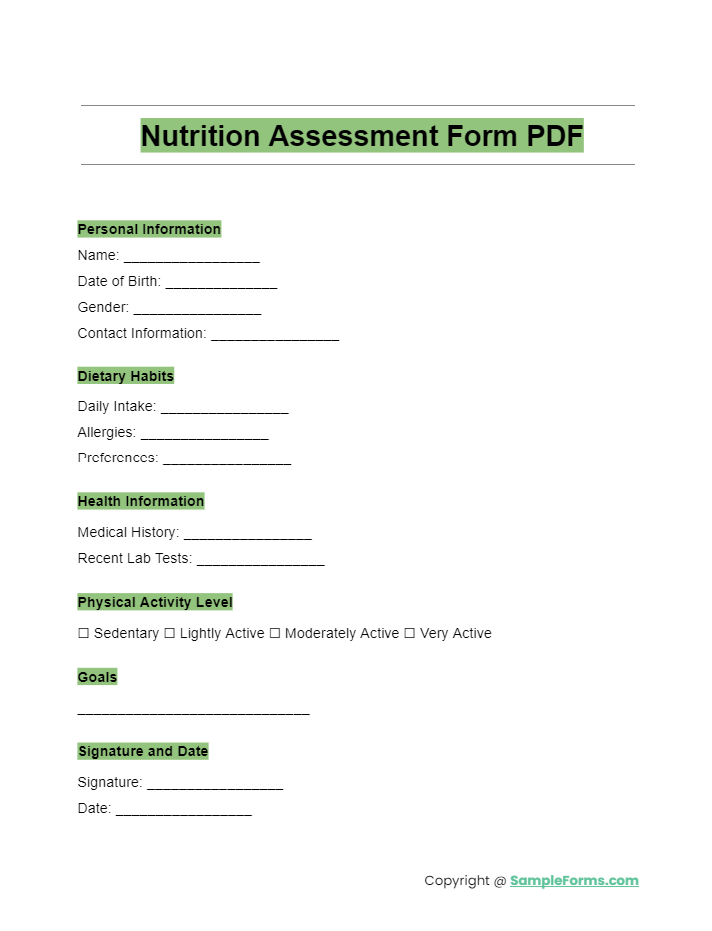
Discover a comprehensive Nutrition Assessment Form PDF that integrates a Skills Assessment Form, perfect for identifying dietary strengths and areas for improvement, enhancing your nutrition planning process. You should also take a look at our Child Assessment Form
Nutrition Assessment Form for Dietitians
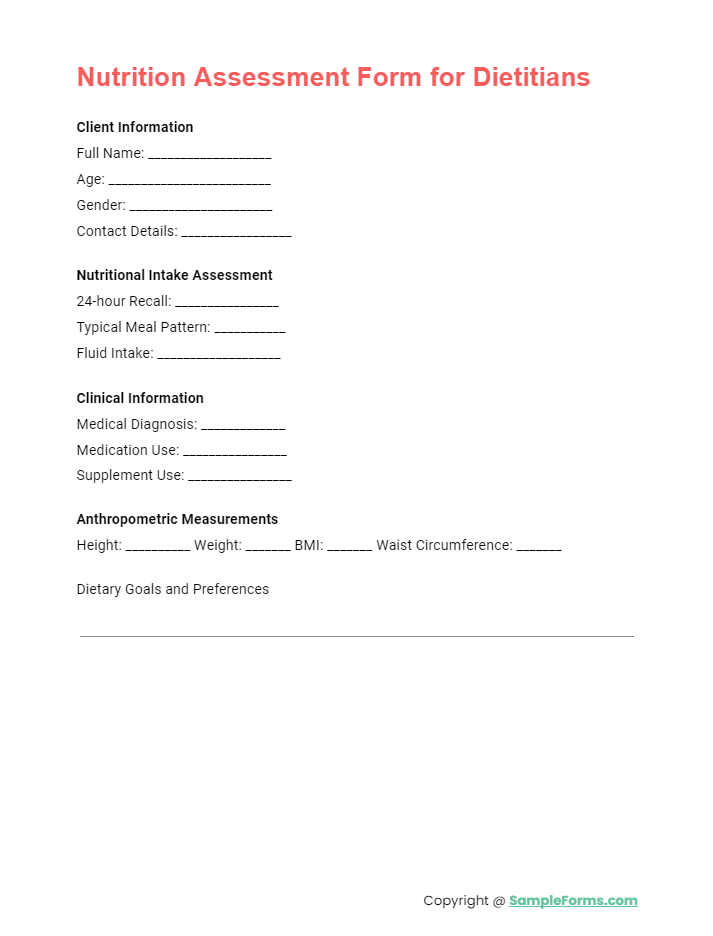
This specialized form for dietitians merges the detailed analysis of a Physical Assessment Form, offering a thorough examination of patients’ dietary habits, nutritional status, and overall health for personalized nutrition planning.
Nutrition Assessment Form Hospital
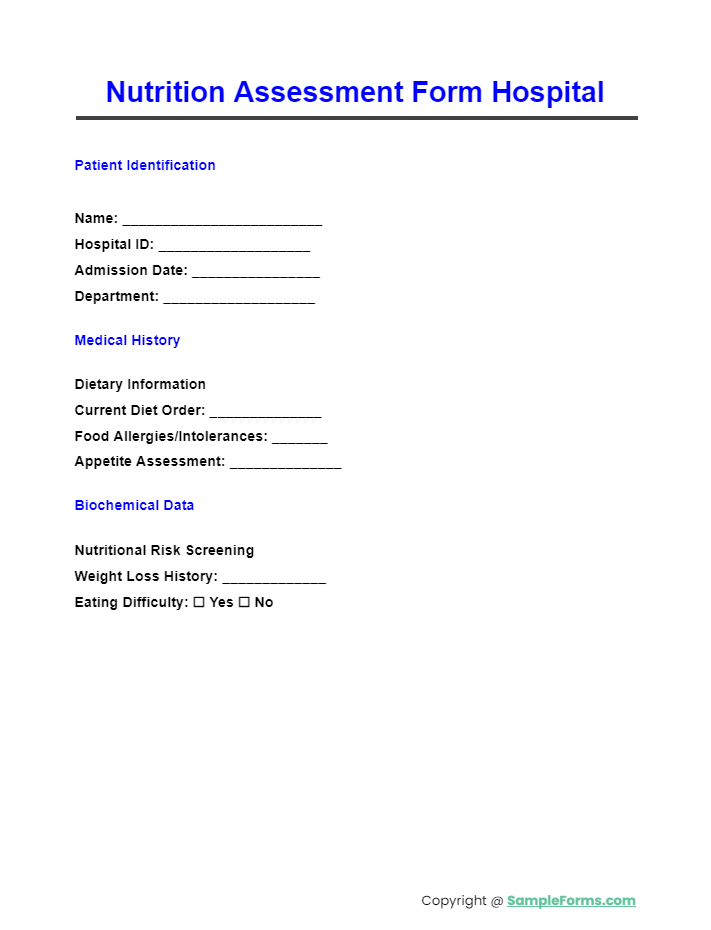
Designed for hospital settings, this form incorporates elements of a Nursing Assessment Form, ensuring patients receive optimal nutritional care based on a comprehensive evaluation of their health and nutritional needs.
Sports Nutrition Assessment Form
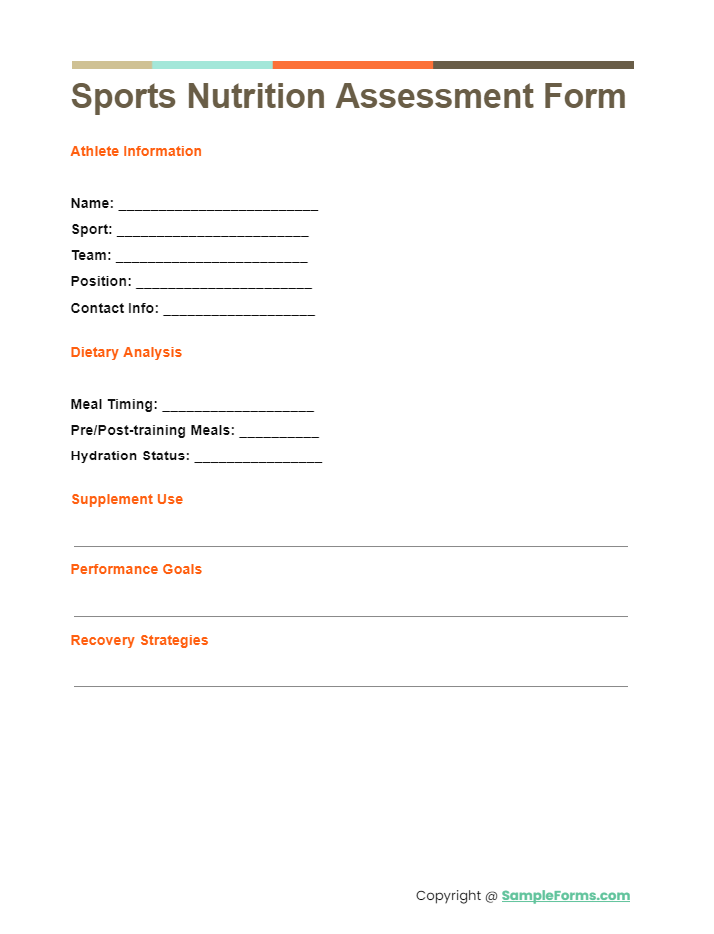
Pediatric Nutrition Assessment Form
Initial Nutrition Assessment
Clinical Nutrition Assessment
Dietitian Nutrition
New Patient Nutrition
Bariatric Nutrition Assessment Form
Sample Nutrition Assessment Form
Fitness Nutrition Assessment
Adult Nutrition Assessment
Outpatient Nutrition in PDF
Sports Nutrition Assessment
Nutrition Counseling
Nutrition Risk Form
What are the Nutrition Assessment Techniques?
In gauging a person’s nutritional intakes there are four ways to do so these being:
- Anthropometrics
- This type of approach in gauging a person nutrition intake by means of measuring a person’s BMI or body mass index by measuring their physical growth such as height, weight, and other physical attributes of the person.
- Biochemical data
- This type of approach in gauging a person nutrition intake by measuring the nutritional intake of the person by analyzing any fluid that originates from the subject such as blood, urine, and even the person’s fecal matter.
- Clinical methods
- This type of approach in gauging a person nutrition intake by doing a simple physical examination with a bit of reviewing the patient’s past medical history.
- Dietary
- This type of approach in gauging a person nutrition intake by analyzing and monitoring the amount of food intake the person ingest daily so as to determine the person’s daily nutritional value.
Each of these nutritional assessment techniques has Nutrition Assessment Form Examples dedicated to each type of examination. Also Check our COSHH Assessment Form.
What are the 5 Components of Nutritional Assessment?
Nutritional assessment is a multifaceted approach that includes:
- Dietary History: Utilizing a Preschool Assessment Form approach, this step involves detailed tracking of an individual’s food intake and eating habits.
- Anthropometric Measurements: Similar to a Training Risk Assessment Form, this involves measurements of body size, shape, and composition.
- Biochemical Tests: Reflecting a Hazard Assessment Form, this includes blood, urine, and other lab tests to assess nutritional status.
- Clinical Examination: A comprehensive health check-up akin to a Assessment Form for Performance, focusing on signs of nutritional deficiencies or excesses.
- Dietary, Behavioral, and Environmental Assessment: Incorporating aspects of a Teacher Assessment Form to understand the influence of behavior and environment on nutritional status.
What Should a Nutritional Assessment Form Include?
A Nutritional Assessment Form should systematically cover:
- Personal Information: Drawing on the Self-Assessment Form, collect demographic and personal health history.
- Dietary Intake: Similar to a Interview Assessment Form, detail the client’s usual dietary patterns and preferences.
- Medical History: Incorporating elements of a Physical Therapy Assessment Form, include any relevant medical conditions that affect nutritional needs.
- Lifestyle Factors: Reflecting a Peer Assessment Form, assess activity level, stress, and other lifestyle factors impacting nutrition.
- Goals and Expectations: As in an Initial Assessment Form, establish the individual’s nutritional goals and expectations from the assessment.
How do you Write a Nutrition Assessment Report?
Writing a nutrition assessment report involves:
- Introduction: Start with an overview similar to a Restaurant Risk Assessment Form, presenting the purpose of the assessment.
- Findings: Detail the results from each component of the assessment, akin to compiling a Risk Assessment Form.
- Analysis: Analyze the data, drawing conclusions about the individual’s nutritional status, comparable to synthesizing information in a Needs Assessment Form.
- Recommendations: Provide tailored dietary and lifestyle recommendations, similar to developing a plan from a Training Needs Assessment Form.
- Conclusion: Summarize the assessment outcomes and suggested action plans.
What are 5 Main Reasons for Nutrition Assessment?
The main reasons for conducting a nutrition assessment include:
- Identifying Nutritional Deficiencies: To detect deficiencies early, akin to a Patient Assessment Form.
- Formulating Personalized Nutrition Plans: Tailoring dietary advice to individual needs, reflecting the approach of a Preschool Assessment Form.
- Monitoring and Evaluating Dietary Interventions: Similar to a Functional Behavior Assessment Form, assessing the effectiveness of nutritional strategies.
- Supporting Overall Health and Well-being: Integrating aspects of a Mental Health Assessment Form to consider the full spectrum of health.
- Enhancing Disease Management: Utilizing insights from a Medical Assessment Form to tailor nutrition for managing health conditions.
What is the Best Example of a Nutritional Assessment?
A best example of a nutritional assessment is a comprehensive evaluation that incorporates a Mental Health Assessment Form. This involves not only looking at dietary intake and nutritional status but also understanding the individual’s mental health and its impact on eating habits and nutritional needs. This multidimensional approach ensures a holistic view of the person’s health.
How long does a Nutritional Assessment Take?
A nutritional assessment typically takes 30 to 60 minutes, similar to filling out a Security Risk Assessment Form, depending on the depth of information collected and analyzed.
What are the Main Purposes of Nutritional Assessment?
The main purposes are identifying nutritional deficiencies, informing diet planning, monitoring health status, and supporting disease management, akin to objectives of a Student Assessment Form.
What is the Nutrition Assessment Tool for the Elderly?
The Nutrition Assessment Tool for the elderly is often a comprehensive questionnaire that includes health, dietary habits, and lifestyle factors, similar to a Pre-Training Assessment Form tailored for older adults.
What is the best nutritional assessment method?
The best method combines dietary surveys, anthropometric measurements, and biochemical tests for a full picture, akin to a multi-faceted Employee Assessment Form.
What is a Direct Assessment of Nutritional Status?
A direct assessment of nutritional status involves physical exams, laboratory tests, and dietary evaluations, comparable to a Construction Risk Assessment Form in terms of specificity and detail.
What is the Nutrition Assessment Note?
A Nutrition Assessment Note is a detailed summary of findings from the assessment, including recommendations, similar to documenting outcomes in a Fire Risk Assessment Form.
Related Posts
-
Content Retention Through Assessment Form [ How to, Importance, Tips ]
-
Enquiry Form
-
FREE 5+ Recruiter Performance Review Forms in PDF | MS Word
-
Job Safety Observation Form
-
FREE 4+ Hazard Observation Forms in PDF
-
FREE 5+ Coach Observation Forms in PDF | MS Word
-
FREE 4+ Child Care Observation Forms in MS Word | PDF
-
FREE 4+ Child Observation Forms in PDF | MS Word
-
Preschool Observation Form
-
Student Observation Form
-
Peer Observation Form
-
Lesson Observation Form
-
Assessment Form
-
The Importance of Risk Assessment and Safety Statement [ What Is, How to Conduct ]
-
Risk Assessments And Safety Statements Guidelines [ What Is, Process ]
